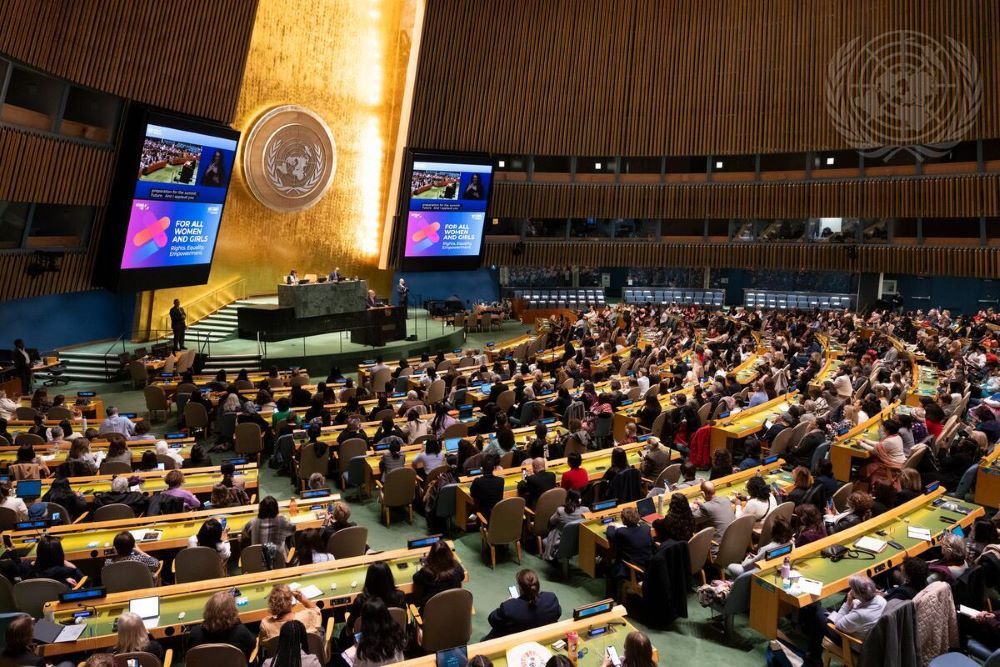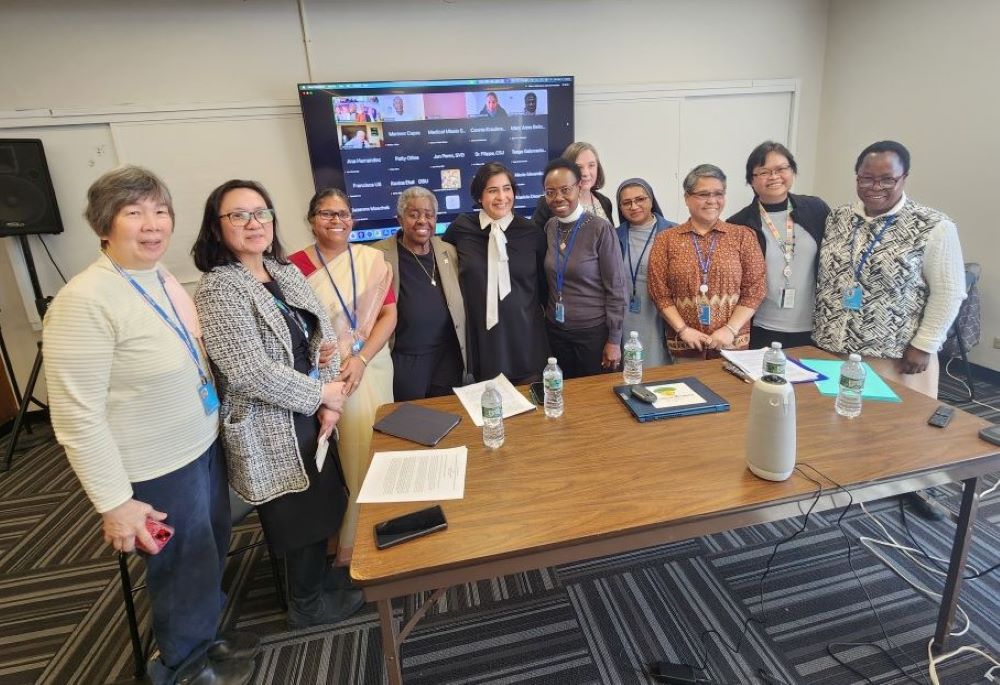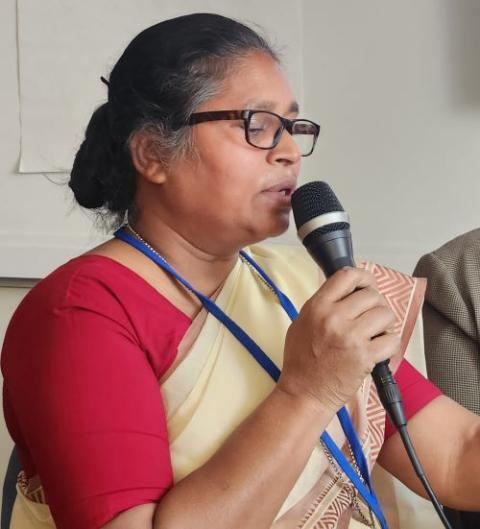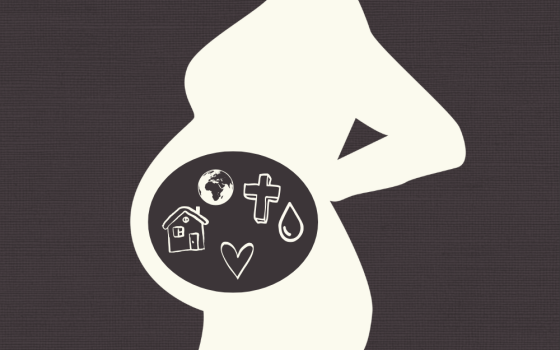
Sima Bahous, executive director of UN Women, appears onscreen at the United Nations' General Assembly Hall during a town hall meeting with the U.N. secretary general and civil society at the 69th session of the Commission on the Status of Women. (UN/Evan Schneider)
Editor's note: This story is part of Global Sisters Report's yearlong series, "Out of the Shadows: Confronting Violence Against Women," which will focus on the ways Catholic sisters are responding to this global phenomenon.

(GSR logo/Olivia Bardo)
In covering the work of Catholic sisters for nearly a decade, I have been consistently impressed by sisters' modesty and humility. Sisters rarely like to have the spotlight on themselves, or even their congregations. The ministries are what is important and paramount.
So, it was a bit surprising but utterly gratifying to hear a number of sisters speak openly during the United Nations' Commission on the Status of Women (March 10-21) about how Catholic sisters "can be models for the spirit of CSW and Beijing at various levels," as Sr. Kayula Lesa, a member of the Religious Sisters of Charity, told me.
Lesa, who has worked extensively in Zambia and Malawi, was referring to the centerpiece of CSW this year — the 30th anniversary of the landmark Beijing Declaration and Platform for Action. Beijing, described as "the most widely endorsed global agenda for women's rights," was a turning point for women. And Catholic sisters can be — and should be — held up as exemplars of that milestone.
Lesa noted to Global Sisters Report, for example, the importance of a long tradition of sisters as teachers and helping empower girls.
In practical terms, Lesa said, that means "empowering [girls] in leadership skills and exploring with them through dialogue the value of equal dignity of men and women and girls and boys."
In promoting a culture of nondiscrimination, Lesa said, sisters help raise the consciousness of girls, helping them to take "action to address [discrimination] when needed."
'In the sacred space of convents, women forged an alternative way of life — one that transcended societal limitations.'
—Sr. Janet Palofax
But beyond this, Lesa added, Catholic sisters "can serve as models in their capacities as leaders. Often, they run institutions that are known for excellence, a demonstration that women have the capacity just as men do and, when given a chance, they perform as well as men do if they have a gift in a particular sphere."
Lesa's remarks helped frame some of the broad strokes that highlight sisters as exemplars. Sr. Janet Palafox, the NGO representative to the U.N. of the Institute of the Blessed Virgin Mary, did much the same.
At a March 11 event focused on women, the church and gender — which was co-sponsored by a number of women's congregations — Palafox said that while it is hard now to imagine a world "where women's voices were largely silenced, where their roles were confined to the shadows of the private sphere," that was the norm a few hundred years ago.
Yet, she noted, in Christianity's first 1,500 years, a powerful counter-narrative emerged.
"In the sacred space of convents, women forged an alternative way of life — one that transcended societal limitations, where study, prayer and spiritual leadership flourished far from the economic pressures and marital expectations that defined so much of their existence."
In doing this, Palafox said, women like Brigid of Kildare, Hilda of Whitby, Hildegard of Bingen and Catherine of Siena "defied the boundaries of their time. They embodied profound spiritual leadership, leading both men and women, guiding their communities through turbulent moments, and challenging structures of power."
These figures, and many more, including from other faith traditions, Palafox said, "remind us of the deep, transformative spirituality that women have brought to their faith communities and society."
But they did something equally important. In the last 500 years, Palafox said, Catholic women religious, including the women who founded the congregations represented at the U.N. meetings, such as Mary Ward (1585-1645), the foundress of Palafox's congregation, "emerged from the shadows of a patriarchal church and claimed a bold and active presence in society."
Their struggle, Palafox said, "has been one not just for equality, but for the very recognition of their call to lead, teach and serve."

Sisters and other participants at a March 11 event focused on women, gender and the church during the United Nations Commission on the Status of Women include Sr. Janet Palafox, second from left; Babita Kumari, third from left; and Sr. Edita Vera, fourth from right. (GSR photo/Chris Herlinger)
Sr. Edita Vera, a member of the Missionary Sisters Servants of the Holy Spirit who recently completed 18 years of ministry in Ethiopia, spoke of the legacy of two women who did that very thing — "who lived with a keen awareness of the signs of the times and made a significant impact through their openness and courage."
Vera, also speaking at the March 11 event, spoke of her congregation's foundresses, Blessed Maria Helena Stollenwerk (1852-1900) and Josepha Hendrina Stenmanns (1852-1903). These women, she said, "devoted their lives to serving the most vulnerable" and their "unwavering commitment" has left a legacy for congregation members who followed them, up until today.
In following and reflecting on the life journeys of her congregation's foundresses, Vera said "we acknowledge how their lives and entrusted mission align with the Beijing Platform for Action's key areas, emphasizing empowerment, leadership and social justice."
Stollenwerk and Stenmanns, Vera said, "believed that education was a powerful tool for transformation."
Under their leadership the first missionary sisters left Europe for Argentina in 1895 with a clear understanding of the needs of the time: education, medical care, and care and respect for Indigenous people.
Advertisement
In opening schools and establishing health clinics, they and the sisters under their charge "transformed countless lives, particularly those of women, girls, and marginalized communities." This passion for education and service soon spread to other continents, with missions in Africa and Oceania.
"In a time when leadership opportunities for women were limited, these pioneers co-founded a global missionary congregation, challenging and breaking traditional barriers," Vera said. "Their leadership proved that women can effectively lead large organizations and inspire others to assume decision-making roles."
That legacy continues today in ministries empowering women, Vera said. In Ethiopia, for example, a center promoting women's rights offers grassroots leadership training for women. Meanwhile, in Paraguay and Argentina, sisters serve as advocates for the marginalized, such as Indigenous people. In Indonesia, meanwhile, congregational members collaborate with other organizations to combat human trafficking and domestic violence.
"The lives of Maria Helena and Josepha remind us of the power of courage, compassion and commitment," Vera said.
Indian Medical Mission Sr. Babita Kumari, made a similar case for Mother Anna Maria Dengel (1892-1980), foundress of her congregation.
Dengel, a native of Austria who studied medicine in Ireland and then worked as a lay missionary doctor, was inspired by Dr. Agnes McLaren, who was concerned about the lack of health care for Muslim women in northern India in an area that is now Pakistan.
The suffering Dengel witnessed there deeply moved and even overwhelmed her.

Indian Medical Mission Sr. Babita Kumari speaks during an event during the United Nations' Commission on the Status of Women March 11. (GSR photo/Chris Herlinger)
In 1925, a century ago, Dengel founded the Society of Catholic Medical Missionaries, today known as Medical Mission Sisters but first known as the Pious Society.
Canon law at the time forbade Catholic sisters to study and practice medicine. "Anna Dengel had to choose between her medical mission or becoming a religious," Kumari said. From 1925 to 1936, Dengel and those in the society performed medical work, but not as vowed religious.
Dengel saw that the only way forward was to form a group of committed, dedicated and professionally trained religious sisters in all branches of health care "who could make a real difference in the lives of Muslim women," Kumari added.
"I was fire and flame," Dengel said about her call and mission. "I was determined to become a missionary doctor, doing something that only women could do for suffering women. This touched the feeling of womanly kinship with me and fired my youthful enthusiasm."
Kumari, who also spoke at the March 11 event, said that Dengel made multiple trips to the Vatican to convince church authorities to change canon law and permit religious women to practice medicine and assist women in childbirth.
Dengel's persistence paid off: In 1936, 11 years after she founded the society, the Vatican changed canon law and permitted women religious to be doctors, making it possible for Dengel and those in the society to make public vows as religious.
"Dr. Anna responded to the crying needs of her time by providing the best health care for those in need," Kumari said. As a result, thousands of women's and children's lives were saved.
Toward the end of her life, Kumari noted, Dengel often said to her sisters: "Our work as medical missionaries was not just charity, it was justice."
For Kumari, reflecting on Dengel's life and example during the 30-year anniversary of the Beijing Declaration and Platform for Action proved to be "a focusing moment, a sort of lens through which we can look at our commitment to be women for women in the last 30 years."
"The understanding of our healing charism today has evolved and keeps evolving in response to the needs of time," she said. "We have moved from direct medical care in hospitals to promotive and preventive health care, with the principle that justice is integral to healing."
Among the "best practices" that amplify the society's contribution to the Beijing Platform for Action include "challenging the structures of injustice, working towards alternative ways that are life-giving for people and the planet. For us, justice is integral to healing."
Challenging norms. Promoting justice. Practicing healing.
During a landmark 30th anniversary year since Beijing, and in a year that has witnessed an important papal transition, those are all ways to celebrate sister exemplars and sister-led leadership — fully deserving immodest praise and thanks from us all.





